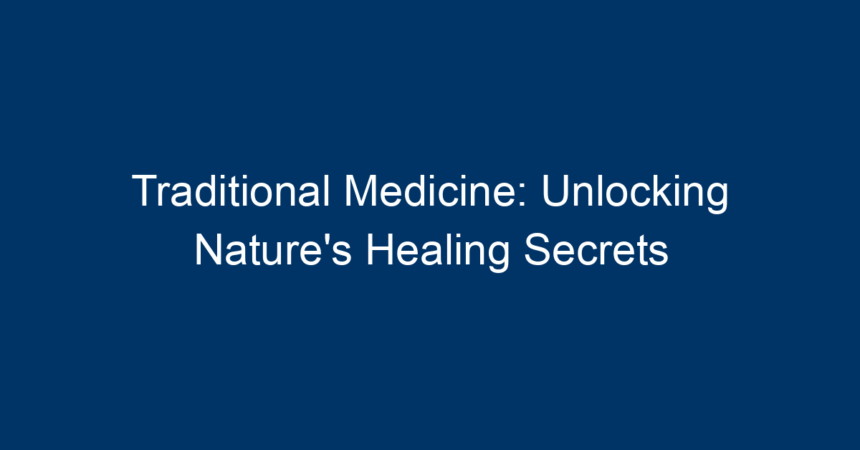In an era dominated by modern pharmaceuticals and high-tech medical treatments, traditional medicine offers a refreshing perspective grounded in centuries of cultural wisdom and natural healing practices. Harnessing nature’s innate abilities, traditional medicine embraces holistic approaches to health, often focusing on prevention and treating the root causes of ailments rather than merely alleviating symptoms. This article delves deep into the world of traditional medicine, uncovering its benefits, practices, and how it can complement modern healthcare.
What is Traditional Medicine?
Traditional medicine refers to a wide array of healthcare practices that have developed over centuries, typically within specific cultures. These practices often encompass a blend of spirituality, folklore, and empirical knowledge passed down through generations. From herbal remedies and acupuncture to meditation and dietary recommendations, traditional medicine practices vary significantly by region and cultural context.
The Origins of Traditional Medicine
The roots of traditional medicine can be traced back to ancient civilizations. For instance:
- Traditional Chinese Medicine (TCM) emphasizes balance and harmony within the body, utilizing techniques such as acupuncture, herbal medicine, and qigong.
- Ayurveda, originating in India, is one of the oldest healthcare systems, focusing on balance among the body’s energies, or doshas, through diet, herbal treatments, and lifestyle changes.
- Ancient Egyptian, Native American, and African traditional medicine systems also played pivotal roles in their respective cultures, relying on local plants and spiritual practices for healing.
These systems not only address physical ailments but also mental and spiritual health, embodying a holistic view of wellness.
The Benefits of Traditional Medicine
1. Holistic Approach
Unlike conventional medicine that often targets specific symptoms or diseases, traditional medicine takes a holistic approach. This perspective considers the interconnectedness of mind, body, and spirit, promoting overall wellness rather than focusing solely on treatment.
2. Use of Natural Remedies
Traditional medicine primarily utilizes natural substances, such as herbs, plants, and minerals, to treat various ailments. By tapping into nature’s pharmacy, these remedies can be more aligned with the body’s natural rhythms and mechanisms, potentially resulting in fewer side effects compared to synthetic drugs.
3. Prevention Focused
Many traditional medicine systems emphasize preventive healthcare, teaching individuals how to maintain health and avert illness through lifestyle changes, dietary choices, and mental well-being practices. This proactive stance can mitigate the rising dependence on invasive surgical procedures and chronic medications.
4. Cultural Sensitivity and Acceptance
Traditional medicine practices are often rooted in the cultural beliefs and values of individuals. When patients engage in healthcare that resonates with their cultural background, they are more likely to adhere to treatment plans and maintain a positive health trajectory.
5. Cost-Effectiveness
With escalating healthcare costs, traditional remedies often prove to be a more affordable option. Many herbs and natural treatments are accessible and can be prepared at home, reducing the financial burden on families and communities.
Key Practices in Traditional Medicine
Herbal Medicine
Herbal medicine utilizes plant-derived substances for therapeutic benefits. This can include tinctures, teas, capsules, or topical applications. Some well-known herbal remedies include:
- Ginger: Known for its anti-inflammatory properties, often used to relieve nausea.
- Echinacea: Commonly employed to boost the immune system.
- Turmeric: Renowned for its antioxidant benefits and ability to combat inflammation.
Acupuncture
Originating from Traditional Chinese Medicine, acupuncture involves inserting thin needles into specific body points to restore energy flow, known as Qi. It is often used to address pain management, anxiety, and various physical ailments.
Meditation and Mindfulness
Numerous traditional health systems incorporate meditation as a crucial practice for mental and emotional well-being. Mindfulness practices help to reduce stress, enhance focus, and foster a deeper connection with oneself.
Bodywork Therapies
These therapies may include massage, chiropractic treatment, or other hands-on techniques designed to release tension and promote physical well-being. Many cultures have their unique styles, such as Thai massage or Shiatsu, each with its principles and techniques.
Integrating Traditional Medicine with Modern Healthcare
Building Bridges
The relationship between traditional and modern medicine is not antagonistic but rather complementary. By fostering collaboration between practitioners of both systems, patients can benefit from a more comprehensive approach to health. Here are some strategies:
-
Education and Awareness: Encourage healthcare professionals to learn about traditional medicine and its benefits. This can help build respect and understanding between practitioners of different medical systems.
-
Research and Evidence-Based Practices: Conduct studies on traditional remedies to scientifically validate their efficacy. This can help integrate the best practices from traditional medicine into mainstream healthcare.
-
Patient-Centered Care: Allow patients to express their preferences for treatment modalities. A more inclusive approach can enhance patient satisfaction and lead to better health outcomes.
- Policy Reform: Advocating for health policies that respect and incorporate traditional medicine can ensure that these practices are legally recognized and accessible to those who choose them.
Challenges Facing Traditional Medicine
Despite its many benefits, traditional medicine faces significant challenges. Some of these include:
-
Regulatory Issues: In many countries, traditional medicine practices lack formal regulations, leading to questions about their safety and efficacy.
-
Cultural Misunderstanding: There is often skepticism towards traditional practices in a modern context, which can hinder acceptance from both patients and healthcare providers.
- Loss of Knowledge: As societies modernize, valuable traditional healing practices and knowledge may be lost, posing a threat to cultural heritage.
Conclusion: Embracing a Holistic Future
In the quest for health and healing, traditional medicine represents a valuable resource that should not be overlooked. By unlocking nature’s healing secrets, we can foster a more holistic approach to healthcare that respects both ancient wisdom and modern advancements. As we move forward, embracing traditional medicine could lead to improved health outcomes, reduced healthcare costs, and a strengthened connection between individuals and their cultures.
Actionable Insights
- Explore Traditional Remedies: Consider incorporating herbal teas or supplements into your daily routine, and research local traditional practices that may enrich your health journey.
- Learn Mindfulness Techniques: Try meditation or yoga as a way to enhance your mental and emotional well-being.
- Engage with Healthcare Professionals: Discuss your interest in traditional medicine with your healthcare provider to explore personalized and integrative solutions for your health needs.
By recognizing the immense potential of traditional medicine, we can truly unlock a more profound understanding of healing—one that honors the gifts of nature while embracing the advances of modern science.




